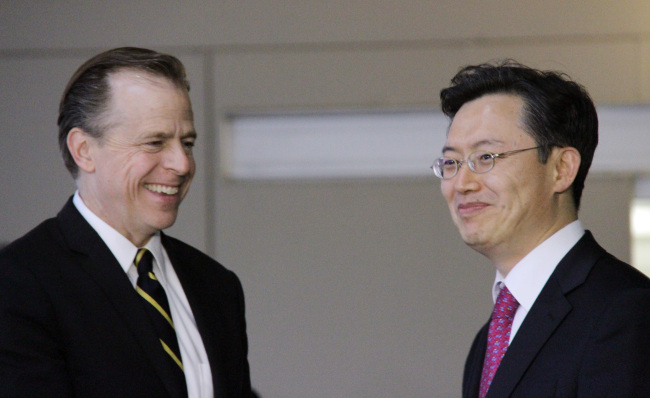The chief negotiators of South Korea, the U.S. and Japan on North Korea’s nuclear weapons program agreed Tuesday to boost cooperation to discourage the communist state from engaging in further provocations amid growing concerns over the possibility of a fourth atomic blast.
They gathered in Washington to discuss ways to ramp up their trilateral coordination as Pyongyang repeatedly threatened a “new form of nuclear test” to beef up its deterrence.
Hwang Joon-kook, Seoul’s new special representative for Korean peninsular peace and security affairs and chief envoy to the six-party talks aimed at denuclearizing the North, warned the Kim Jong-un regime against another underground detonation, saying it would have to “pay the due price.”
“North Korea’s nuclear test will pose a head-on challenge to the international community and a threat to world peace and safety,” he told reporters after the meeting.
“The representatives of the three countries expressed grave concerns over the possibility of an additional North Korean provocation and agreed to make united and effective efforts to prevent it.”
 |
Hwang Joon-kook (right), South Korea’s top negotiator on the North’s nuclear program, meets his U.S. counterpart Glyn Davies in Washington on Monday after a trilateral meeting which also involved Japan’s Junichi Ihara. (Yonhap) |
On March 30, Pyongyang said it would not rule out a “new type of nuclear test” in protest against the U.N. Security Council’s condemnation of its test-firing of ballistic missiles late last month and international criticism over its appalling human rights record.
Its deputy U.N. ambassador Ri Tong-il warned again last Friday that his country “made it very clear we will carry out a new form of nuclear test,” without elaborating.
The three envoys exchanged views on the North’s options regarding the experiment, Hwang said. Experts have raised the possibility of multiple explosions and the use of a uranium device, hydrogen bomb or “boosted fission weapon,” which they call a 1.5-generation atomic bomb.
“In the event of a further provocation (nuclear test), we conferred on how we would respond differently together with the international community including the U.N. Security Council,” the diplomat added.
While slamming the North’s recent ballistic missile launches, they also restated their commitment to the watershed Sept. 19, 2005, joint statement and its “core goal” of a verifiable denuclearization of the peninsula in a peaceful manner, the U.S. State Department said.
“We also reiterated our commitment to the full and transparent implementation of all U.N. Security Council resolutions concerning the DPRK (North Korea) and urged the DPRK to refrain from further threatening actions,” it said in a statement.
“We pledged to continue working … to focus international attention on the deplorable human rights situation in North Korea, and to hold the DPRK accountable for its systematic and ongoing violations of the human rights of its people.”
The consultation followed a trilateral summit late last month in The Hague on the sidelines of the Nuclear Security Summit, during which the three countries’ leaders reaffirmed that the six-nation forum should ensure “substantive progress” in dismantling Pyongyang’s nuclear programs.
For Hwang, the four-day trip marked his first chance since his appointment last week to foster rapport with his counterparts ― Glyn Davies, special representative for North Korea policy at the U.S. Department of State, and Junichi Ihara, director general for Asian and Oceanian affairs at the Japanese Foreign Ministry. Hwang also held separate meetings with each of the envoys.
By Shin Hyon-hee (
heeshin@heraldcorp.com)








